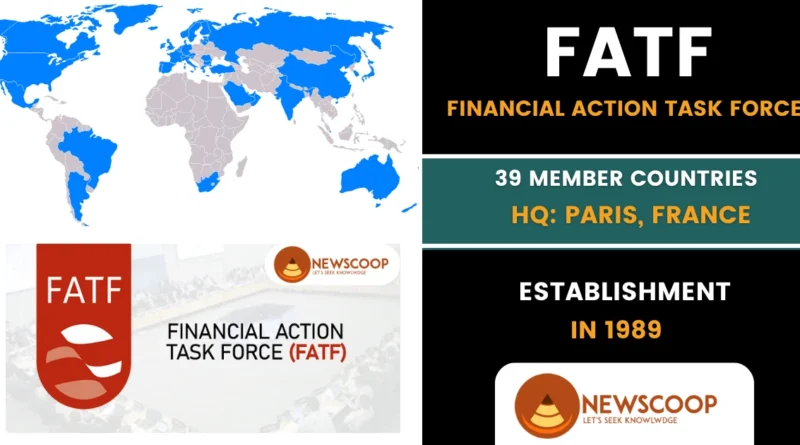Financial Action Task Force (FATF): Black & Grey List
The Financial Action Task Force (FATF) is an intergovernmental organization that plays a crucial role in combating money laundering, terrorist financing, and other threats to the integrity of the international financial system.
The FATF holds great importance for UPSC preparation as it plays a crucial role in international relations, national security, and financial governance. This article aims to provide an overview of the FATF, its objectives, functions, black & grey lists, and its relevance to the UPSC syllabus.
| Organization | Financial Action Task Force (FATF) |
| Founded | 1989 |
| Headquarters | Paris, France |
| Purpose | Combat money laundering & terrorist financing |
| Members | 39 full members |
| First President: | Jean-François Thony (France) |
| Current President | T. Raja Kumar |
| Focus | Sets international standards and recommendations for anti-money laundering (AML) and counter-terrorist financing (CTF) measures |
History of Financial Action Task Force (FATF) for UPSC
The Financial Action Task Force (FATF) was established in 1989 by the Group of Seven (G7) countries as an intergovernmental organization to combat money laundering. Over the years, its mandate expanded to include addressing terrorist financing and other financial crimes. Understanding the history and background of the FATF provides insight into its development and significance in the global fight against financial crimes.
Establishment of FATF: The FATF was founded in response to growing concerns about the global impact of money laundering. In July 1989, the G7 finance ministers met in Paris and established the FATF. Initially, it consisted of 16 member countries, including the G7 nations and other jurisdictions. The organization’s secretariat was established in Paris to support its activities.
Expansion of Mandate: Following September 11, 2001, terrorist attacks in the United States, the FATF recognized the close connection between money laundering and terrorist financing. As a result, it expanded its mandate to include combating terrorist financing as a core objective. This expansion led to the development of specific recommendations and standards to address the challenges posed by terrorist financing.
Evolution of FATF Recommendations: The FATF Recommendations, initially known as the Forty Recommendations, were first issued in 1990. They provided a comprehensive framework for member countries to establish effective anti-money laundering measures. Over the years, these recommendations underwent several revisions to adapt to emerging threats and challenges.
Purpose of the Financial Action Task Force (FATF)
The FATF’s primary purpose is to combat money laundering, terrorist financing, and the proliferation of weapons of mass destruction. It aims to protect the integrity of the international financial system by developing and promoting global standards, recommendations, and best practices in anti-money laundering and counter-terrorist financing measures.
Objectives of FATF
The objectives of the Financial Action Task Force (FATF) can be summarized as follows:
- Develop and promote international standards to combat money laundering, terrorist financing, and proliferation financing.
- Facilitate effective implementation of recommendations and standards by member countries.
- Enhance international cooperation and collaboration among member countries and other stakeholders.
- Identify emerging threats and trends in financial crimes and provide guidance to address them.
- Promote transparency and accountability in the financial sector.
- Strengthen global resilience against money laundering, terrorist financing, and other financial crimes.
- Encourage international compliance with FATF standards and foster cooperation among countries.
Membership of FATF
Full Members: FATF has 39 full members, which include 37 member jurisdictions and two regional organizations. The member jurisdictions are countries that have been granted full membership status in the FATF. The two regional organizations are the Gulf Cooperation Council (GCC) and the European Commission (EC).
Associated FATF-Style Regional Members: In addition to the full members, FATF has nine associated FATF-style regional members. These are organizations that have similar objectives to the FATF and work towards setting up systems to combat terrorism and money laundering in their respective regions.
Headquarters
The headquarters of the Financial Action Task Force (FATF) is located in Paris, France.
FATF Lists
The Financial Action Task Force (FATF) maintains two important lists, namely the Blacklist (High-Risk and Non-Cooperative Jurisdictions List) and the Grey List (Jurisdictions Under Increased Monitoring). These lists serve as risk assessment tools in combating money laundering, terrorist financing, and proliferation financing.
1. Black List
- Called High-Risk and Non-Cooperative Jurisdictions to call for action
- Identifies jurisdictions with significant deficiencies in anti-money laundering and counter-terrorist financing measures.
- Serves as a warning to the international community.
- Encourages countermeasures and sanctions against these high-risk jurisdictions.
Countries on the Black List of FATF
The following countries are on the FATF Blacklist (High-Risk and Non-Cooperative Jurisdictions List):
- Iran
- Myanmar
- North Korea
2. Grey List
- Also called Jurisdictions Under Increased Monitoring.
- Includes jurisdictions committed to addressing deficiencies but with strategic deficiencies remaining.
- Subject to enhanced monitoring and review by the FATF.
- Calls for enhanced due diligence by member countries when dealing with entities in these jurisdictions.
Countries in Grey List of FATF
The following countries are on the FATF Greylist (High-Risk and Non-Cooperative Jurisdictions List):
- Albania
- Barbados
- Botswana
- Burkina Faso
- Ghana
- Mauritius
- Morocco
- Nicaragua
- Pakistan
- Panama
- Syria
- Uganda
- Yemen
- Zimbabwe, etc.
| Black List | Grey List | |
|---|---|---|
| Definition | High-risk and non-cooperative | Jurisdictions under increased monitoring |
| Reason for Inclusion | Significant deficiencies | Strategic deficiencies with commitments to reform |
| Scrutiny and Monitoring | High level of scrutiny | Increased monitoring and review by the FATF |
| Risk Perception | Negative perception | Moderate risk perception |
| Financial Consequences | Countermeasures and sanctions | Enhanced due diligence recommended |
| International Cooperation | Urged to cooperate | Encouraged to cooperate |
| Impact on Financial Institutions | Increased regulatory scrutiny | Enhanced due diligence and risk assessment |
| Removal Process | Demonstrated significant progress required | Progress assessment for potential removal |
Consequences of FATF Grey List
The consequences of being in the FATF Grey List (Jurisdictions Under Increased Monitoring) can include:
- Economic Sanctions: The grey-listed country may face economic sanctions from international financial institutions such as the International Monetary Fund (IMF), World Bank, and Asian Development Bank (ADB). These sanctions can restrict or limit the country’s access to financial assistance and loans.
- Difficulty in Obtaining Loans: Being on the grey list can make it challenging for the country to secure loans from international financial institutions like the IMF, World Bank, and ADB. These institutions may impose stricter conditions or additional scrutiny before granting financial assistance.
- Reduction in International Trade: The country may experience a decline in international trade due to the perception of higher financial risks associated with doing business with grey-listed jurisdictions. Foreign investors and trade partners may be more cautious in engaging in commercial activities with the country.
- International Boycott: In some cases, there may be instances of international boycotts or reduced cooperation with the grey-listed country. This can involve limitations on diplomatic relations, trade restrictions, or decreased foreign investments.
India & FATF
India’s participation in the Financial Action Task Force (FATF) as a member country holds significant importance in its efforts to combat money laundering and terrorist financing. Here is an overview of India’s engagement with the FATF:
Membership: In 2010, India became a member of the FATF, signaling its commitment to implementing and adhering to the FATF’s recommendations and guidelines.
Mutual Evaluations: The FATF conducts mutual evaluations of member countries to assess their compliance with anti-money laundering and counter-terrorist financing standards. India has undergone these evaluations to evaluate the effectiveness of its measures in combating financial crimes.
AML and CTF Measures: India has implemented robust anti-money laundering (AML) and counter-terrorist financing (CTF) measures in alignment with the FATF’s recommendations. This includes enacting legislation, establishing dedicated financial intelligence units, and enhancing cooperation between law enforcement agencies.
Cooperation with FATF: India actively collaborates with the FATF and its regional body, the Asia-Pacific Group on Money Laundering (APG). It engages in meetings, shares information, and cooperates with other member countries to tackle money laundering and terrorist financing effectively.
India was Added in Grey List: In 2019, India was placed on the FATF’s Grey List due to identified deficiencies in its AML and CTF framework. However, India swiftly undertook comprehensive measures to address these concerns, leading to its removal from the Grey List in 2020.
Continued Focus on AML/CTF Measures: India maintains its focus on enhancing its AML and CTF measures even after its removal from the Grey List. The country continues to strengthen its regulatory frameworks, improve inter-agency coordination, and foster public-private partnerships to combat financial crimes effectively.
India’s engagement with the FATF reflects its commitment to combating money laundering, terrorist financing, and other financial crimes. By actively participating in the FATF’s activities and implementing necessary reforms, India strives to align its AML and CTF frameworks with international standards set by the FATF.
FATF Revision for UPSC
- The Financial Action Task Force (FATF) is an intergovernmental organization established in 1989.
- It is headquartered in Paris, France.
- FATF combats money laundering, terrorist financing, and proliferation financing globally.
- In 2001, the focus of FATF expanded to include measures against terrorist financing after the 9/11 attacks.
- It sets international standards and promotes their implementation among member countries.
- FATF consists of 39 member countries and jurisdictions.
- India has been a member of FATF since 2010.
- Conducts mutual evaluations to assess compliance with anti-money laundering and counter-terrorist financing standards.
- It maintains two lists: the Blacklist (High-Risk and Non-Cooperative Jurisdictions List) and the Grey List (Jurisdictions Under Increased Monitoring).
- Blacklisted countries face significant deficiencies and may suffer financial consequences and sanctions.
- Grey-listed countries are under increased monitoring and require reforms.
- FATF encourages international cooperation and information sharing among member countries.
- India actively participates in FATF activities and implements necessary reforms to combat financial crimes.
Conclusion
In conclusion, the Financial Action Task Force (FATF) is an international organization focused on combating financial crimes. It sets global standards and encourages cooperation among member countries. The FATF conducts evaluations to assess compliance with these standards.
Further, it maintains lists to identify jurisdictions with deficiencies in their anti-money laundering and counter-terrorist financing measures. The organization aims to enhance global efforts in preventing money laundering, terrorist financing, and proliferation financing.
Thank You!
FAQs
When was the Financial Action Task Force (FATF) founded?
The Financial Action Task Force (FATF) was founded in 1989 to combat money laundering, terrorist financing, and related financial crimes on a global scale.
Where is the headquarters of the FATF located?
The headquarters of the FATF is located in Paris, France.
What is the primary purpose of the FATF?
The primary purpose of the FATF is to develop and promote policies aimed at combating money laundering and terrorist financing.

